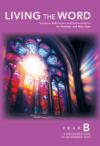Understanding the Word
By Dianne Bergant, C.S.A.
The woman in the poem from Proverbs is traditionally described as virtuous or worthy. However, the adjective in Hebrew has a much stronger sense. It denotes might or strength, the kind of valor found in armies. It is in this sense that the woman is worthy. This woman is extraordinary, not because valiant women cannot be found, but that among all valiant women this one is remarkable. She exemplifies virtues such as self-sufficiency, industry, versatility, trustworthiness, constancy, and general goodness. She is virtuous and successful because she possesses the wisdom that flows from fear of the Lord. Among all women, the one who fears the Lord is truly valiant.
The mysterious “day of the Lord” will be a day of rejoicing for the righteous, but one of sorrow for the wicked. Paul employs two powerful metaphors to describe this day. Its unexpected nature resembles a thief in the night; the suffering that accompanies it is referred to as “the birth pangs of the messiah.” Paul uses the light-darkness, day-night dichotomies to describe both the situation in which the Thessalonians find themselves and the vigilance that this situation demands. As children of light and of the day, they must be alert, always on the watch so that when the day of the Lord comes, they are not found unprepared.
The parable in today’s Gospel throws light on the meaning of preparedness. It is not a disposition of passive waiting or non-engagement because of the fear of possible failure. Rather, the preparedness rewarded here stems from the realization that one is a steward of the goods of another, and knowing the disposition of that other, one seeks to maximize the potential of those goods. The time of waiting is a period of opportunity, of active engagement, of creative growth. One’s future salvation does not rest on the extent or quality of one’s talent, but on how one utilizes that talent as one waits for the master to return.
